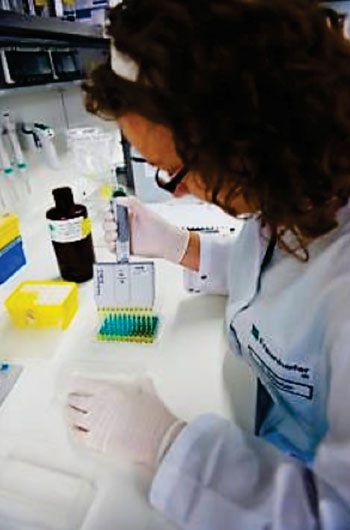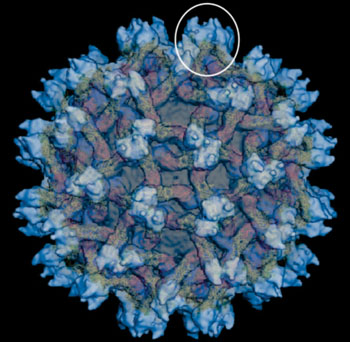Novel Immunoassay Developed to Diagnose Dengue
|
By LabMedica International staff writers Posted on 17 Jan 2016 |

Image: Novel Immunoassay for Dengue virus (Photo courtesy of Fraunhofer IZI).

Image: The immature dengue viral particle. Notable are the 60 protein “spikes” which jut from the surface, making the immature particle far less smooth than the mature form (Photo courtesy of Purdue University).
Until now, it has been difficult to diagnose whether someone is suffering from dengue fever or whether they have contracted another flavivirus, such as yellow fever, West Nile virus, or Tick-borne encephalitis virus (TBEV).
Although there are already tests on the market, but none of them can tell the difference between these individual flaviviruses and if a definitive diagnosis is required, a sample of the patient's blood has to be sent to a high-security laboratory for analysis.
Scientists at the Fraunhofer Institute for Cell Therapy and Immunology (Leipzig, Germany) have developed a definitive antibody test for Dengue virus. Conventional antibody tests are performed by the health professional who draws the patient's blood. If infected with the Dengue virus, the blood will contain specific antibodies produced by the body to attack the intruder. The laboratory staffer then applies the blood to a test platform with dengue antigens that systematically bind with these antibodies. If, after a set reaction time, antibodies are found on the platform, the physician will assume that the patient has been infected with the Dengue virus. The catch is that, although the antigens bind with the antibodies according to the lock and key principle, they almost always do so at the same site as all other flaviviruses. This means that, even when the test is positive, no one can say for sure that it is actually a case of dengue.
The scientists hope that their test will hit the market around one year from now. In a further step, they are working on ways to differentiate between the four strains of the dengue pathogen. This could be an important breakthrough: Anyone who has survived a dengue-related illness has then acquired immunity against that specific pathogen, but when it comes to the other three strains, that person is at even greater risk. This is because the antibodies they produced to combat the first bout of dengue fever actually help the new virus to spread and make it much harder for that person to recover.
Dr. Sebastian Ulbert, Head of the Working Group on Vaccine Technologies, said, “We've succeeded in developing the first ever antibody test for dengue infections that is capable of distinguishing between dengue and other flaviviruses. Since our test is also based on detecting antibodies, it's just as cheap and easy to run as its conventional counterparts. Our test system has the potential to differentiate between the four viral strains.” The new method can easily be integrated into existing test setups and at no extra cost to manufacturers.
Related Links:
Fraunhofer Institute for Cell Therapy and Immunology
Although there are already tests on the market, but none of them can tell the difference between these individual flaviviruses and if a definitive diagnosis is required, a sample of the patient's blood has to be sent to a high-security laboratory for analysis.
Scientists at the Fraunhofer Institute for Cell Therapy and Immunology (Leipzig, Germany) have developed a definitive antibody test for Dengue virus. Conventional antibody tests are performed by the health professional who draws the patient's blood. If infected with the Dengue virus, the blood will contain specific antibodies produced by the body to attack the intruder. The laboratory staffer then applies the blood to a test platform with dengue antigens that systematically bind with these antibodies. If, after a set reaction time, antibodies are found on the platform, the physician will assume that the patient has been infected with the Dengue virus. The catch is that, although the antigens bind with the antibodies according to the lock and key principle, they almost always do so at the same site as all other flaviviruses. This means that, even when the test is positive, no one can say for sure that it is actually a case of dengue.
The scientists hope that their test will hit the market around one year from now. In a further step, they are working on ways to differentiate between the four strains of the dengue pathogen. This could be an important breakthrough: Anyone who has survived a dengue-related illness has then acquired immunity against that specific pathogen, but when it comes to the other three strains, that person is at even greater risk. This is because the antibodies they produced to combat the first bout of dengue fever actually help the new virus to spread and make it much harder for that person to recover.
Dr. Sebastian Ulbert, Head of the Working Group on Vaccine Technologies, said, “We've succeeded in developing the first ever antibody test for dengue infections that is capable of distinguishing between dengue and other flaviviruses. Since our test is also based on detecting antibodies, it's just as cheap and easy to run as its conventional counterparts. Our test system has the potential to differentiate between the four viral strains.” The new method can easily be integrated into existing test setups and at no extra cost to manufacturers.
Related Links:
Fraunhofer Institute for Cell Therapy and Immunology
Latest Microbiology News
- Blood-Based Viral Signature Identified in Crohn’s Disease
- Hidden Gut Viruses Linked to Colorectal Cancer Risk
- Three-Test Panel Launched for Detection of Liver Fluke Infections
- Rapid Test Promises Faster Answers for Drug-Resistant Infections
- CRISPR-Based Technology Neutralizes Antibiotic-Resistant Bacteria
- Comprehensive Review Identifies Gut Microbiome Signatures Associated With Alzheimer’s Disease
- AI-Powered Platform Enables Rapid Detection of Drug-Resistant C. Auris Pathogens
- New Test Measures How Effectively Antibiotics Kill Bacteria
- New Antimicrobial Stewardship Standards for TB Care to Optimize Diagnostics
- New UTI Diagnosis Method Delivers Antibiotic Resistance Results 24 Hours Earlier
- Breakthroughs in Microbial Analysis to Enhance Disease Prediction
- Blood-Based Diagnostic Method Could Identify Pediatric LRTIs
- Rapid Diagnostic Test Matches Gold Standard for Sepsis Detection
- Rapid POC Tuberculosis Test Provides Results Within 15 Minutes
- Rapid Assay Identifies Bloodstream Infection Pathogens Directly from Patient Samples
- Blood-Based Molecular Signatures to Enable Rapid EPTB Diagnosis
Channels
Clinical Chemistry
view channelNew Blood Test Index Offers Earlier Detection of Liver Scarring
Metabolic fatty liver disease is highly prevalent and often silent, yet it can progress to fibrosis, cirrhosis, and liver failure. Current first-line blood test scores frequently return indeterminate results,... Read more
Electronic Nose Smells Early Signs of Ovarian Cancer in Blood
Ovarian cancer is often diagnosed at a late stage because its symptoms are vague and resemble those of more common conditions. Unlike breast cancer, there is currently no reliable screening method, and... Read moreMolecular Diagnostics
view channel
Study Uses Blood Samples to Identify Diseases Years Before They Start
Chronic diseases such as lupus, rheumatoid arthritis, Crohn’s disease, colon cancer, and heart failure often develop silently for years before symptoms appear. By the time they are diagnosed, significant... Read more
MicroRNA-Based Method Predicts CKD and Cardiovascular Risk
Chronic kidney disease (CKD) affects more than 850 million people worldwide and is a rapidly growing public health threat. Although it progressively damages kidney function, many patients die prematurely... Read moreHematology
view channel
Rapid Cartridge-Based Test Aims to Expand Access to Hemoglobin Disorder Diagnosis
Sickle cell disease and beta thalassemia are hemoglobin disorders that often require referral to specialized laboratories for definitive diagnosis, delaying results for patients and clinicians.... Read more
New Guidelines Aim to Improve AL Amyloidosis Diagnosis
Light chain (AL) amyloidosis is a rare, life-threatening bone marrow disorder in which abnormal amyloid proteins accumulate in organs. Approximately 3,260 people in the United States are diagnosed... Read moreImmunology
view channel
Immune Signature Identified in Treatment-Resistant Myasthenia Gravis
Myasthenia gravis is a rare autoimmune disorder in which immune attack at the neuromuscular junction causes fluctuating weakness that can impair vision, movement, speech, swallowing, and breathing.... Read more
New Biomarker Predicts Chemotherapy Response in Triple-Negative Breast Cancer
Triple-negative breast cancer is an aggressive form of breast cancer in which patients often show widely varying responses to chemotherapy. Predicting who will benefit from treatment remains challenging,... Read moreBlood Test Identifies Lung Cancer Patients Who Can Benefit from Immunotherapy Drug
Small cell lung cancer (SCLC) is an aggressive disease with limited treatment options, and even newly approved immunotherapies do not benefit all patients. While immunotherapy can extend survival for some,... Read more
Whole-Genome Sequencing Approach Identifies Cancer Patients Benefitting From PARP-Inhibitor Treatment
Targeted cancer therapies such as PARP inhibitors can be highly effective, but only for patients whose tumors carry specific DNA repair defects. Identifying these patients accurately remains challenging,... Read morePathology
view channel
Molecular Imaging to Reduce Need for Melanoma Biopsies
Melanoma is the deadliest form of skin cancer and accounts for the vast majority of skin cancer-related deaths. Because early melanomas can closely resemble benign moles, clinicians often rely on visual... Read more
Urine Specimen Collection System Improves Diagnostic Accuracy and Efficiency
Urine testing is a critical, non-invasive diagnostic tool used to detect conditions such as pregnancy, urinary tract infections, metabolic disorders, cancer, and kidney disease. However, contaminated or... Read moreTechnology
view channel
AI-Driven Diagnostic Demonstrates High Accuracy in Detecting Periprosthetic Joint Infection
Periprosthetic joint infection (PJI) is a rare but serious complication affecting 1% to 2% of primary joint replacement surgeries. The condition occurs when bacteria or fungi infect tissues around an implanted... Read more
Blood Test “Clocks” Predict Start of Alzheimer’s Symptoms
More than 7 million Americans live with Alzheimer’s disease, and related health and long-term care costs are projected to reach nearly USD 400 billion in 2025. The disease has no cure, and symptoms often... Read moreIndustry
view channel
Cepheid Joins CDC Initiative to Strengthen U.S. Pandemic Testing Preparednesss
Cepheid (Sunnyvale, CA, USA) has been selected by the U.S. Centers for Disease Control and Prevention (CDC) as one of four national collaborators in a federal initiative to speed rapid diagnostic technologies... Read more
QuidelOrtho Collaborates with Lifotronic to Expand Global Immunoassay Portfolio
QuidelOrtho (San Diego, CA, USA) has entered a long-term strategic supply agreement with Lifotronic Technology (Shenzhen, China) to expand its global immunoassay portfolio and accelerate customer access... Read more




















